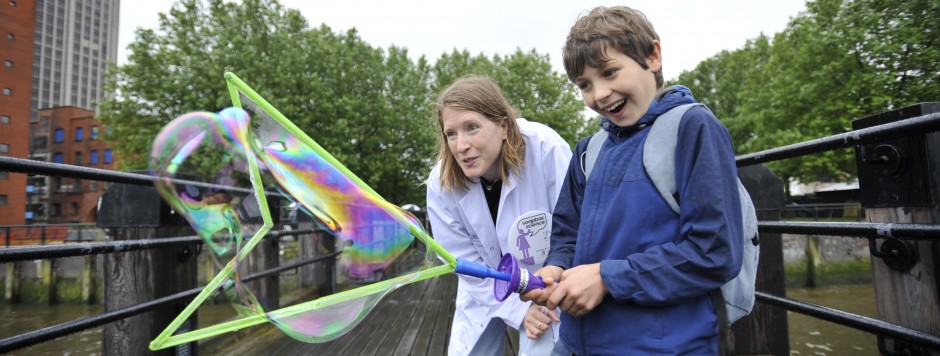 Alba Maiques-Diaz is a Spanish scientist who possesses a PhD in Biomedicine and is currently in her 2nd year as a postdoctoral researcher at the Cancer Research UK- Manchester Institute/University of Manchester. Since her first year at university she has been fascinated by how cells work, how they are organized to make tissues, organs and finally a whole working body! Amazing! She has yet so far focused her research on the opposite scenario: what happens when cells become deregulated and eventually, will initiate a disease, as cancer. She studies how leukaemias (blood cancers) arise and progress, with a special emphasis on finding new treatments. Want to hear more? Catch Alba at our Manchester event, on saturday the 23rd of July!
Alba Maiques-Diaz is a Spanish scientist who possesses a PhD in Biomedicine and is currently in her 2nd year as a postdoctoral researcher at the Cancer Research UK- Manchester Institute/University of Manchester. Since her first year at university she has been fascinated by how cells work, how they are organized to make tissues, organs and finally a whole working body! Amazing! She has yet so far focused her research on the opposite scenario: what happens when cells become deregulated and eventually, will initiate a disease, as cancer. She studies how leukaemias (blood cancers) arise and progress, with a special emphasis on finding new treatments. Want to hear more? Catch Alba at our Manchester event, on saturday the 23rd of July!
SS: Alba, how did you get to your current position?
AMD: When I finished secondary school I was sure I wanted to study biology, and I was (really happy) to be accepted into one of Madrid’s universities. I think it was in the second year when I had biochemistry for the first time, that it became clear: I wanted to be a researcher and work in a lab. I wanted to understand the cellular processes.
It wasn’t easy to got there, as in Spain, with the cuts in funding it’s getting increasingly difficult to get a PhD position. But I was lucky enough to start helping in a lab at the National Institute of Cancer Research (CNIO) in my last year of university, and could stay there to do my Master’s thesis. After that, the PhD was just the continuation of my effort! Doing a thesis is a long and hard process, but it made me realize I wanted to continue doing science. When I was about to finish, I found a postdoctoral offer in Manchester, at Tim Somervaille’s lab. I knew and really liked his work, and it was the perfect choice to continue my career!
SS: What, or who, inspired you to get a career in science?
AMD: In my family there is no one with a scientific background but I guess the enthusiasm to understand processes (either political, social or biological) was a common edge to both my parents and my sister. I had some very enthusiastic teachers, starting from my biology teacher during secondary school (he was key for me deciding to study this!) and another few at university. Also having an encouraging (female) supervisor during my PhD, that helped not only with the science but with the personal management of it, and was key to pursuing it. Finally, discovering scientists (especially women) like (for example) Lynn Margulis, Marie Curie and Rita Levi-Molntalcini who loved, performed and communicated science, was also very inspiring. All those people showed me ways to enjoy the thrill of the doing, learning and discovering of science.
SS: What is the most fascinating aspect of your research/work?
AMD: The creativity, freedom and the fact that you never stop learning. I believe having a profession that makes you constantly improve and challenge yourself is incredibly rewarding. It’s true that it could be less demanding and a bit easier, but trying to understand the biology of a cell can’t be too easy…
I’ve always known that I wanted to work in something connected to humans (in my case, human diseases). Understanding a process that (hopefully) might, in the future, help others with a disease is something that really keeps me on track.
SS: What attracted you to Soapbox Science in the first place?
AMD: That it was a completely different way of communicating science, starting form the venue: scientists going where the people are and not the opposite! Which allows us to do something completely different form our (quite rigid) scientific meetings. And very importantly to help change the paradigm that women don’t do science and the image that scientists are a group of white men in their 50s (nothing more far form reality!).
SS: Sum up in one word your expectations for the day – excitement? Fear? Thrill? Anticipation?
AMD: Excitement!
SS: If you could change one thing about the scientific culture right now, what would it be?
AMD: I would like it to be more cooperative and less individualistic and competitive. That could mean (for example) taking into account collaborations more when reviewing grant applications, or other scientific activities that engage your university or community rather than prioritising whether you have a publication in a top journal…
SS: What would be your top recommendation to a female PhD student considering pursuing a career in academia?
AMD: Believe in yourself and enjoy the journey. If you like science then just keep on trying, looking, working. There is not any one single way to get to anywhere and you’ll make yours.
